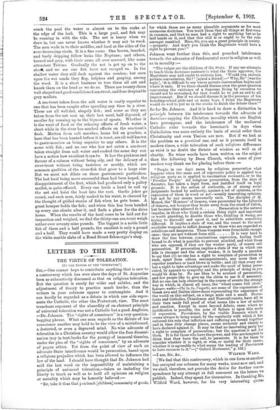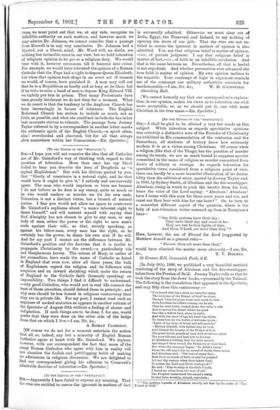LETTERS TO THE EDITOR.
THE VIRTUE OF TOLERATION.
(To TILE EDITOR OF TUE "SPECTATOR." J Silt,—One cannot hope to contribute anything that is new to a controversy which has ever since the days of St. Augustine been so exhaustively discussed as that on religious toleration. But the question is surely far wider and subtler, and the adjustment of theory to practice much harder, than the writers in your columns appear to contemplate. And it can hardly be regarded as a debate in which one side repre- sents the Catholic, the other the Protestant, view. The most trenchant exponent of the absurdity of an abstract principle of universal toleration was not a Catholic but a good Anglican, —Dr. Johnson. The "rights of conscience" is a very question- begging phrase. What one man regards as the dictate of his conscience another may hold to be the view of a misinformed, a distorted, or even a depraved mind. No wise advocate of toleration in a Christian country would allow the free dissemi- nation (say in test-books for the young) of immoral theories, under the plea of the " rights of conscience," by an advocate of pagan ethics. Yet from the point of view of such an advocate State interference would be persecution, based upon a religious prejudice which has been allowed to influence the law of the land. I should have thought that Dr. Johnson had said the last word on the impossibility of maintaining a principle of universal toleration,—taken as including the liberty to teach as well as to hold all opinions on religion or morality which may be honestly believed :— "Sir, take it thui that you teach [children] community of goods, for which there are as many plausible arguments as for most erroneous doctrines. You teach them that all things at first were in common, and that no man had a right to anything bat as he laid hands on it, and that this still is or ought to be the ride amongst mankind. Here, Sir, you sap a great principle in society —property. And don't you think the Magistrate would have a right to prevent you ? "
Johnson went farther than this, and preached intolerance towards the advocates of fundamental error in religion as well as in morality :— " The vulgar are the children of the State. If any one attempts to teach them doctrines contrary tc what the State approves, the Magistrate may and ought to restrain him. Would you restrain private conversation, Sir ? ' [asked a friend].—' Why, Sir' [was the reply], 'it is difficult to say where private conversation begins and where it ends. If we three should discuss even the great question concerning the existence of a Supreme Being by ourselves we should not be restrained, for that would be to put an end to all improvement. But if we should discuss it in the presence of ten boarding-school girls and as many boys, I think the Magistrate would do well to put us in the stocks to finish the debate there. "
So far Dr. Johnson. And it is hard to draw a distinction in principle between his intolerance towards the advocate of doctrines sapping the Christian morality which our English laws presuppose, and the intolerance of the mediaeval Catholic ruler towards the beresiarch in days when Catholicism was more entirely the basis of social order than Christianity and even Theism are now. But if we look at the problem as a practical one, and as it presents itself in modern times, a wide toleration of such religions differences as exist is no doubt the dictate of wisdom as well as of charity. No wiser words have been written on the subject than the following by Dean Church, which some of your readers may thank me for placing before them :— "People in our days mean by religious persecution what happens when the same sort of repressive policy is applied to a religious party as is applied to vaccination recusants, or to the Peculiar People.' All religious persecution, from the days of Socrates, has taken a legal form, and justified itself on legal grounds. It is the action of authority, or of strong social judgments backed by authority, against a set of opinions, or the expression of them in word or act—usually innovating opinions, but not by any means necessarily such. The disciples of M. Monod, the Momiers' of Geneva, were persecuted by the Liberals of Geneva, not because they broke away from the creed of Calvin,
but because they adhered to it Persecution is the natural impulse, in those who think a certain thing right and important or worth guarding, to disable those who, thinking it wrong, are trying to discredit and upset it, and to substitute something different. It implies a state of war, and the resort to the most available weapons to inflict damage on those who are regarded as rebellious and dangerous. These weapons were formidable enough
once: they are not without force still It is very hard to draw the line between conscientious repression, feeling itself bound to do what is possible to prevent mischief, and what those who are opposed, if they are the weaker party, of course call persecution. If persecution implies a state of war in which one side is stronger and the other weaker, it is hardly a paradox to say that (1) no one has a right to complain of persecution as such, apart from odious accompaniments, any more than of superior numbers or hard blows in battle; and (2) that every one has a right to take advantage and make the most of being perse- cuted, by appeals to sympathy and the principle of doing as you would be done by. No one likes to be accused of persecution, and few people like to give up the claim to use it if necessary. But no one can help observing in the course of events the strange way in which, in almost all cases, the wheel comes full circle.' 8pderarrs raliav —Chi la fa, l'aspetti, are some of the expressions of Greek awe and Italian shrewdness representing the experience of the world on this subject, on a large scale and a small. Protes- tants and Catholics, Churchmen and Nonconformists, have all in their turn made full proof of what seems like a law of action and reaction. Except in cases beyond debate, cases where no justification is possible, the note of failure is upon this mode of repression. Providence, by the visible Nemesis which it seems always to bring round, by the regularity with which it has enforced the rule that infliction and suffering are bound together and in time duly change places, seems certainly and clearly to have declared against it. It may be that no innovating party has a right to complain of persecution ; but the question is not for them. It is for those who have the power, and who are tempted to think that they have the call, to persecute. It is for them to consider whether it is right, or wise, or useful for their cause; whether it is agreeable to what seems the leading of Providence to have recourse to it."—(" Oxford Movement," p. 152.) We feel that this controversy, which in one form or another has occupied our columns for many weeks, must now end, and we shall, therefore, not provoke the desire for further corre- spondence by any attempt at full comment on the letters we publish. Indeed, they speak for themselves. In thanking Mr. Wilfrid Ward, however, for his very interesting quota- tioim, we must point out that we, at any rate, recognise no infallible authority on such matters, and however much we may admire Dr. Johnson, we cannot consider that a passage from Boswell is in any way conclusive. Dr. Johnson had a bigoted, not a liberal, mind. Mr. Ward will, no doubt, see nothing but invincible error in our view, but we hold toleration of religious opinion to be per se a religious duty. We would bear with it, however erroneous, till it festered into crime. For example, we would have tolerated the opinion of a Roman Catholic that the Pope had a right to depose Queen Elizabeth, but when that opinion took shape in an overt act of treason we would, of course, have punished it. A man may call out that he is a Republican as loudly and as long as he likes, but if be tries to raise a band of men to depose King Edward VII. we rightly put him in prison. That many Protestants have been grossly intolerant we do not deny for a moment. What we do assert is that the tendency in the Anglican Church has been increasingly in favour of tolerance. The English Reformed Church has striven to include as much, not as little, as possible, and what she could not include she has in her best moments striven to tolerate. The passage from Jeremy Taylor referred to by a correspondent in another letter marks the authentic spirit of the English Church,- a spirit often, alas ! overclouded and obscured, but for all that always alive somewhere within her Communion.—En. Spectator.]







































 Previous page
Previous page